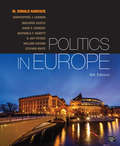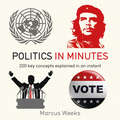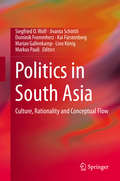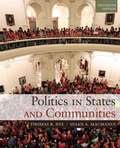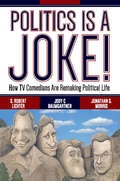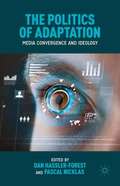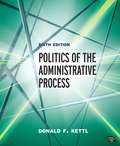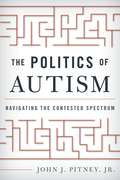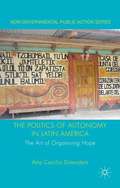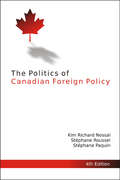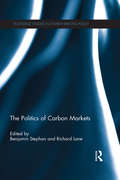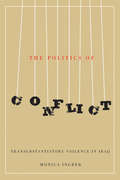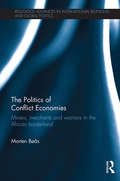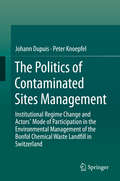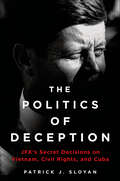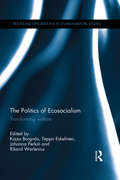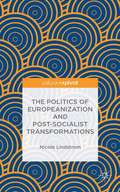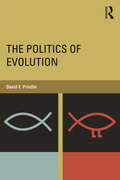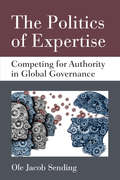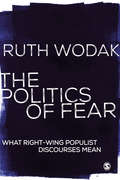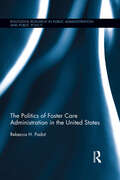- Table View
- List View
Politics in Europe
by M. Donald Hancock Christopher J. Carman Marjorie Castle David P. Conradt Raffaella Y. Nanetti Robert Leonardi William N. Safran Stephen L. WhiteThoroughly updated, this sixth edition of Hancock et al.’s Politics in Europe remains an approachable yet rigorous introduction to the region—the UK, France, Germany, Italy, Sweden, Russia, Poland, and the European Union. Its strong analytic framework and organization, coupled with detailed country coverage written by country experts, ensure that students not only get a robust introduction to each country, but also are able to make meaningful cross-national comparisons. Key updates include the latest in European politics, including recent election results, the content and impact of the Eurozone crisis, the emergence of a new “Nordic model” of welfare capitalism, and coverage of key social and political issues including globalization, terrorism, immigration, gender, religion, and transatlantic relations.
Politics in Minutes: 200 Key Concepts Explained In An Instant (In Minutes)
by Marcus WeeksQuick, accessible, compact guide to understanding key political concepts. Contents include: Liberty, Justice, Equality, Human rights, Social contract, Democracy, Monarchy, Anarchism, Capitalism, Socialism, Nationalism and Globalisation.
Politics in South Asia
by Siegfried O. Wolf Jivanta Schöttli Dominik Frommherz Kai Fürstenberg Marian Gallenkamp Lion König Markus PauliThe book introduces central themes that have preoccupied the field of South Asian politics over the last few decades and identifies new, emerging areas of research. Presenting both general political theory and context-specific case studies, the collection draws attention to the methodological challenges of working on an area-specific theme and the importance of generating generalizable insights linked to theory. Hence it will be of interest for political scientists working on South Asian politics as well as on other non-Western societies. The collection represents an unusually broad survey of scholarship emerging from a range of leading academic centres in the field.
Politics in States and Communities
by Thomas Dye Susan MacManusPolitics in States and Communities is distinguished by its focus on politics, its comparative approach, its concern with thorough explanation, its interest in policy, and its focus on conflicts in states and communities. Several themes are carried on throughout the book that emphasize the importance of politics at the state and community level including the “conflict management” theme which emphasizes the sources and nature of conflict in society, how key decision makers act in conflict situations, and how “politicos” emerge and determine “who gets what.”
Politics Is a Joke!: How TV Comedians Are Remaking Political Life
by S. Robert LichterDoes late night political humor matter? Are late-night comedians merely entertaining, or do they have the power to influence the way we think about politics and politicians? Politics Is a Joke! situates late night comedy in the historical context of political humor and demonstrates how the public turn to this venue for political information, and are in turn affected by it. Using exclusive data collected by the Center for Media and Public Affairs, the authors conduct a detailed and exhaustive analysis of political jokes on late night TV shows dating back to 1992 in order to pinpoint the main targets and themes of late-night comedy. Politics Is a Joke! uses a wide range of examples, from jokes about politicians' physical appearance and sex scandals to jokes about Congress and even the news media, to assess and understand the impact of political humor on political institutions, politicians and their policies and behavior. Engagingly written with analysis of jokes from comedians like Jay Leno, Conan O'Brien, Jon Stewart and Stephen Colbert, Politics is a Joke! is essential reading for anyone who wants to understand the crucial role late night comedy plays in our political universe - and anyone who enjoys a good laugh.
The Politics of Adaptation
by Dan Hassler-Forest Pascal NicklasIn the 21st century, the parallel movements of media convergence and globalization have reshaped our understanding of media boundaries. The rise of digital culture has increased our access to narrative media, while also providing new ways of engaging with them. But, at the same time, global media corporations have intensified their power over these media and the channels through which they reach us. This book brings together a broad range of scholarly approaches to the challenges and opportunities of adaptation studies in this new era. Together, they focus on the political and ideological tensions that underlie and shape processes of adaptation and cultural transformation in the age of media convergence.
Politics of The Administrative Process
by Donald F. KettlThoroughly updated with new scholarship, data, and events, this text remains reader-friendly with its engaging opening vignettes and rich examples--told only the way prolific author and columnist Don Kettl can. With three case studies in every chapter, students apply ideas and analysis as they read. Useful critical thinking questions at the end of each case help shape student responses and in-class conversation.
The Politics of Advanced Capitalism
by Pablo BeramendiThis book serves as a sequel to two distinguished volumes on capitalism: Continuity and Change in Contemporary Capitalism (Cambridge, 1999) and Order and Conflict in Contemporary Capitalism (1985). Both volumes took stock of major economic challenges advanced industrial democracies faced, as well as the ways political and economic elites dealt with them. However, during the last decades, the structural environment of advanced capitalist democracies has undergone profound changes: sweeping deindustrialization, tertiarization of the employment structure, and demographic developments. This book provides a synthetic view, allowing the reader to grasp the nature of these structural transformations and their consequences in terms of the politics of change, policy outputs, and outcomes. In contrast to functionalist and structuralist approaches, the book advocates and contributes to a 'return of electoral and coalitional politics' to political economy research.
The Politics of African Industrial Policy
by Lindsay WhitfieldThis book engages in the debate on growth versus economic transformation and the importance of industrial policy, presenting a comprehensive framework for explaining the politics of industrial policy. Using comparative research to theorize about the politics of industrial policy in countries in the early stages of capitalist transformation that also experience the pressures of elections due to democratization, this book provides four in-depth African country studies that illustrate the challenges to economic transformation and the politics of implementing industrial policies.
The Politics of Autism: Navigating the Contested Spectrum
by John J. PitneyIn the first book devoted exclusively to the contentious politics of autism, noted political scientist and public policy expert John J. Pitney, Jr. , explains how autism has evolved into a heated political issue disputed by scientists, educators, social workers, and families. Nearly everything about autism is subject to debate and struggle, including its measurement and definition. Organizational attempts to deal with autism have resulted in not a single autism policy, but a vast array of policies at the federal, state, and local levels, which often leave people with autism and their families frustrated and confused. Americans with autism are citizens, friends, coworkers, sons, daughters, fathers, and mothers. No longer simply the objects of public policy, they are active participants in current policy debates. Pitney s fascinating look at how public policy is made and implemented offers networks of concerned parents, educators, and researchers a compass to navigate the current systems and hope for a path towards more regularized and effective policies for America s autism community. "
The Politics of Autonomy in Latin America
by Ana Cecilia DinersteinThe author contests older concepts of autonomy as either revolutionary or ineffective vis-à-vis the state. Looking at four prominent Latin American movements, she defines autonomy as 'the art of organising hope': a tool for indigenous and non-indigenous movements to prefigure alternative realities at a time when utopia can be no longer objected.
The Politics of Canadian Foreign Policy, Fourth Edition
by Kim Nossal Stéphane Paquin Stéphane RousselThe fourth edition of this widely used text includes updates about the many changes that have occurred in Canadian foreign policy under Stephen Harper and the Conservatives between 2006 and 2015. Subjects discussed include the fading emphasis on internationalism, the rise of a new foreign policy agenda that is increasingly shaped by domestic political imperatives, and the changing organization of Canada’s foreign policy bureaucracy. As in previous editions, this volume analyzes the deeply political context of how foreign policy is made in Canada. Taking a broad historical perspective, Kim Nossal, Stéphane Roussel, and Stéphane Paquin provide readers with the key foundations for the study of Canadian foreign policy. They argue that foreign policy is forged in the nexus of politics at three levels – the global, the domestic, and the governmental – and that to understand how and why Canadian foreign policy looks the way it does, one must look at the interplay of all three.
The Politics of Canadian Foreign Policy, Fourth Edition (Queen's Policy Studies Series #188)
by Kim Richard Nossal Stéphane Roussel Stéphane PaquinThe fourth edition of this widely used text includes updates about the many changes that have occurred in Canadian foreign policy under Stephen Harper and the Conservatives between 2006 and 2015. Subjects discussed include the fading emphasis on internationalism, the rise of a new foreign policy agenda that is increasingly shaped by domestic political imperatives, and the changing organization of Canada’s foreign policy bureaucracy. As in previous editions, this volume analyzes the deeply political context of how foreign policy is made in Canada. Taking a broad historical perspective, Kim Nossal, Stéphane Roussel, and Stéphane Paquin provide readers with the key foundations for the study of Canadian foreign policy. They argue that foreign policy is forged in the nexus of politics at three levels – the global, the domestic, and the governmental – and that to understand how and why Canadian foreign policy looks the way it does, one must look at the interplay of all three.
The Politics of Carbon Markets (Routledge Studies in Environmental Policy)
by Benjamin Stephan Richard LaneThe carbon markets are in the middle of a fundamental crisis - a crisis marked by collapsing prices, fleeing actors, and ever increasing greenhouse gas levels. Yet carbon trading remains at the heart of global attempts to respond to climate change. Not only this, but markets continue to proliferate - particularly in the Global South. The Politics of Carbon Markets helps to make sense of this paradox and brings two urgently needed insights to the analysis of carbon markets. First, the markets must be understood in relation to the politics involved in their development, maintenance and opposition. Second, this politics is multiform and pervasive. Implementation of new techniques and measuring tools, policy development and contestation, and the structuring context of institutional settings and macro-social forces all involve a variety of political actors and create new forms of political agency. The contributions study the total extent of the carbon markets, from their prehistory to their contemporary expansion and wider impacts. This wide-ranging political perspective on the carbon markets is invaluable to those studying and interested in ecological markets, climate change governance and environmental politics.
The Politics of Conflict
by Monica IngberBy looking at the problem of complicity in political violence from a social versus a legal perspective, The Politics of Conflict offers readers new insight into the ways in which violence operates. To do this, Monica Ingber applies Gilles Deleuze's analysis of the novellas of Leopold Sacher-Masoch, particularly Venus in Furs, to the politics of violence in Iraq. Specifically, Ingber develops the concept of transubstantiatory violence, to think through the relationship between social complicity and political violence. By assessing politics in Iraq through the lens of transubstantiatory violence, it becomes possible to see how social complicity validates what would be otherwise viewed as illegitimate forms of violence. This legitimization of violence is addressed through the problematization of the modern correlation of security, law, and the social contract by exploring three key areas of socio-politics: state-making and nation-building, political movements, and the popular militia. A serious study that makes important contributions to political science, political philosophy, and conflict studies, The Politics of Conflict demonstrates an alternative view of violence that is provocative in its ability to destabilize dominant understandings of regime violence and the counter-reactions of opposition movements.
The Politics of Conflict Economies: Miners, merchants and warriors in the African borderland (Routledge Advances in International Relations and Global Politics)
by Morten BøåsConflict economies cannot be approached in isolation but must instead be contextualised socially and historically. These economies did not emerge in vacuum, but are part and parcel of the history of people and place. This book explores the informal and illicit extraction and trade of minerals and other types of natural resources that takes place in the 'borderlands' during periods of conflict. This type of extraction and marketing, often referred to as ‘conflict trade’ depends on a weak state, and works alongside the structures of the state and its officials. The book emphasises that conflicts do not start as competition over natural resources and in turn suggests that the integration of the extraction and marketing of natural resources only starts once fighting is well under way. Boas argues that although economic agendas are an integral part of African conflicts, the desire to accumulate is not the only motivation. Thus, in order to present a more comprehensive analysis of conflict we need to take into account political, cultural, and historical factors, in addition to the economic dimensions of conflict. This book will be of very strong interest to students and scholars of political economy, conflict studies, international relations and development.
The Politics of Contaminated Sites Management
by Johann Dupuis Peter KnoepfelBy the end of the 1970s, contaminated sites had emerged as one of the most complex and urgent environmental issues affecting industrialized countries. The authors show that small and prosperous Switzerland is no exception to the pervasive problem of sites contamination, the legacy of past practices in waste management having left some 38,000 contaminated sites throughout the country. This book outlines the problem, offering evidence that open and polycentric environmental decision-making that includes civil society actors is valuable. They propose an understanding of environmental management of contaminated sites as a political process in which institutions frame interactions between strategic actors pursuing sometimes conflicting interests. In the opening chapter, the authors describe the influences of politics and the power relationships between actors involved in decision-making in contaminated sites management, which they term a "wicked problem. " Chapter Two offers a theoretical framework for understanding institutions and the environmental management of contaminated sites. The next five chapters present a detailed case study on environmental management and contaminated sites in Switzerland, focused on the Bonfol Chemical Landfill. The study and analysis covers the establishment of the landfill under the first generation of environmental regulations, its closure and early remediation efforts, and the gambling on the remediation objectives, methods and funding in the first decade of the 21st Century. The concluding chapter discusses the question of whether the strength of environmental regulations, and the type of interactions between public, private, and civil society actors can explain the environmental choices in contaminated sites management. Drawing lessons from research, the authors debate the value of institutional flexibility for dealing with environmental issues such as contaminated sites.
The Politics of Deception: JFK's Secret Decisions on Vietnam, Civil Rights, and Cuba
by Patrick J. SloyanInvestigative reporter Patrick J. Sloyan, a former member of the White House Press Corps, revisits the last years of John F. Kennedy's presidency, his fateful involvement with Diem's assassination, the Cuban Missile Crisis and the Civil Rights Movement. Using recently released White House tape recordings and interviews with key inside players, The Politics of Deception reveals:Kennedy's secret behind-the-scenes deals to resolve the Cuban Missile Crisis.The overthrow and assassination of President Diem.Kennedy's hostile interactions with and attempts to undermine Martin Luther King, Jr. Kennedy's secret and fascinating dealings with Diem, General Curtis LeMay, King and Fidel Castro. Kennedy's last year in office, and his preparation for the election that never was.The Politics of Deception is a fresh and revealing look at an iconic president and the way he attempted to manage public opinion and forge his legacy, sure to appeal to both history buffs and those who were alive during his presidency.
The Politics of Ecosocialism: Transforming welfare (Routledge Explorations in Environmental Studies)
by Kajsa Borgnäs Teppo Eskelinen Johanna Perkiö Rikard WarleniusAs the global economy seeks to recover from the financial crisis and warnings about the consequences of climate change abound, it is clear that we need a fundamentally new approach to tackle these issues. This innovative book offers a unique perspective, stressing the necessity of both ecological and social change as it discusses how to create a "red-green" or "eco-socialist" society. Examining the current crises of welfare capitalism as well as the challenges and conflicts of an eco-socialist society, the book proposes a new social order that would combine the ideals of egalitarianism and of environmental sustainability. It analyses the key social and ecological issues related to the welfare state, including green Keynesianism, ecological Marxism, the limits of growth and no-growth, capitalist barriers to a renewable energy transition, proposals for a universal basic income and the role of technology. Finally, the book outlines possible paths of transformation towards creating an eco-socialist society, drawing out lessons that can be applied internationally. This book will be of great interest to students and researchers in economics, environmental studies and political science.
The Politics of Europeanization and Post-Socialist Transformations
by Nicole LindstromThe book compares the politics of Europeanization in Estonia and Slovenia from 1989 to the current crisis.
The Politics of Evolution
by David F. PrindleThe controversy over teaching evolution or creationism in American public schools offers a policy paradox. Two sets of values—science and democracy—are in conflict when it comes to the question of what to teach in public school biology classes. Prindle illuminates this tension between American public opinion, which clearly prefers that creationism be taught in public school biology classes, versus the ideal that science, and only science, be taught in those classes. An elite consisting of scientists, professional educators, judges, and business leaders by and large are determined to ignore public preferences and teach only science in science classes despite the majority opinion to the contrary. So how have the political process and the Constitutional law establishment managed to thwart the people’s will in this self-proclaimed democracy? Drawing on a vast body of work across the natural sciences, social sciences, and humanities, Prindle explores the rhetoric of the evolution issue, explores its history, examines the nature of the public opinion that causes it, evaluates the Constitutional jurisprudence that upholds it, and explains the political dynamic that keeps it going. This incisive analysis is a must-read in a wide range of disciplines and for anyone who wants to understand the politics of biology.
The Politics Of Expertise: Competing For Authority In Global Governance
by Ole Jacob SendingExperts dominate all facets of global governance, from accounting practices and antitrust regulations to human rights law and environmental conservation. In this study, Ole Jacob Sending encourages a critical interrogation of the role and power of experts by unveiling the politics of the ongoing competition for authority in global governance. Drawing on insights from sociology, political science, and institutional theory, Sending challenges theories centered on particular actors' authority, whether it is the authority of so-called epistemic communities, the moral authority of advocacy groups, or the rational-legal authority of international organizations. Using in-depth and historically oriented case studies of population and peacebuilding, he demonstrates that authority is not given nor located in any set of particular actors. Rather, continuous competition for recognition as an authority to determine what is to be governed, by whom, and for what purpose shapes global governance in fundamental ways. Advancing a field-based approach, Sending highlights the political stakes disguised by the technical language of professionals and thus opens a broader public debate over the key issues of our time.
The Politics of Fear: What Right-Wing Populist Discourses Mean
by Ruth WodakInstructors - Electronic inspection copies are available or contact your local sales representative for an inspection copy of the print version. Winner of the Austrian Book Prize for the 2016 German translation, in the category of Humanities and Social Sciences. Populist right-wing politics is moving centre-stage, with some parties reaching the very top of the electoral ladder: but do we know why, and why now? In this book Ruth Wodak traces the trajectories of such parties from the margins of the political landscape to its centre, to understand and explain how they are transforming from fringe voices to persuasive political actors who set the agenda and frame media debates. Laying bare the normalization of nationalistic, xenophobic, racist and antisemitic rhetoric, she builds a new framework for this ‘politics of fear’ that is entrenching new social divides of nation, gender and body. The result reveals the micro-politics of right-wing populism: how discourses, genres, images and texts are performed and manipulated in both formal and also everyday contexts with profound consequences. This book is a must-read for scholars and students of linguistics, media and politics wishing to understand these dynamics that are re-shaping our political space.
The Politics of Fear: What Right-Wing Populist Discourses Mean
by Ruth WodakPopulist right-wing politics is moving centre-stage, with some parties reaching the very top of the electoral ladder: but do we know why, and why now? In this book Ruth Wodak traces the trajectories of such parties from the margins of the political landscape to its centre, to understand and explain how they are transforming from fringe voices to persuasive political actors who set the agenda and frame media debates. Laying bare the normalization of nationalistic, xenophobic, racist and antisemitic rhetoric, she builds a new framework for this 'politics of fear' that is entrenching new social divides of nation, gender and body. The result reveals the micro-politics of right-wing populism: how discourses, genres, images and texts are performed and manipulated in both formal and also everyday contexts with profound consequences. This book is a must-read for scholars and students of linguistics, media and politics wishing to understand these dynamics that are re-shaping our political space.
The Politics of Foster Care Administration in the United States (Routledge Research in Public Administration and Public Policy)
by Rebecca H. PadotGovernment-by-proxy and intergovernmental relations profoundly affect the public administration of foster care. Using examples from foster care systems in the states of Delaware, Michigan, New York, and Rhode Island, Rebecca Padot eloquently combines a rigorous methodology and theory work to expose the conditions under which foster care outcomes can be improved. The cases selected suggest that the federal government has increased its focus on measuring the performance of state programs while simultaneously decreasing its funding of state foster care programs and offering the states very little management or mentorship. Padot turns the page and recommends administrators place a greater priority on building community partners, integrating the advice of mentors, providing leadership from public managers, and cultivating relationships with the federal government. An original and timely resource for scholars and practitioners, this book represents a significant contribution to our understanding of how leadership and management variables may be associated with more positive foster care practices and performance in the United States.
